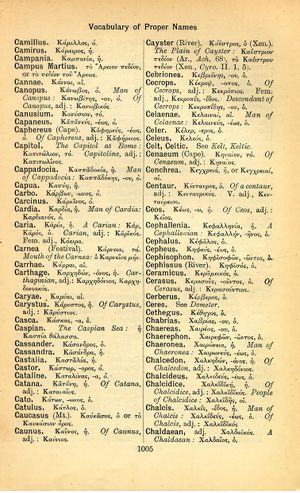Cato
Θνητὸς πεφυκὼς τοὐπίσω πειρῶ βλέπειν → Homo natus id, quod instat, ut videas, age → Als sterblich Wesen mühe dich zu seh'n, was folgt
English > Greek (Woodhouse)
Κάτων, -ωνος, ὁ.
Latin > English (Lewis & Short)
Căto: ōnis, m. 1. catus,
I a cognomen of several celebrated Romans in the gens Porcia, Valeria, Vettia al.
I M. Porcius Cato the elder, distinguished as a rigid judge of morals; hence with the appel. Censorius; whose most celebrated works were the Origines and De Re Rustica, Cic. de Or. 3, 33, 135; Liv. 31, 1 sqq.; Plin. 7, 27, 28, § 100; 7, 30, 31, § 112; cf., concerning him, Bernhardy, Röm. Litt. p. 521 sq.; 650; Bähr, Lit. Gesch. p. 515; 258; 354 al.; Ellendt, Cic. Brut. p. xix.-xxv.—As appel. of a severe judge, Mart. 1, prooem. fin.; Phaedr. 4, 7, 21.—Hence,
B Cătōnĭānus, a, um, adj., of Cato: familia, Cic. Q. Fr. 4, 6, 5: aetas, Sen. Tranq. 7, 5: illa (i. e. praecepta), id. Ep. 94, 27: lingua, i. e. of high morality, Mart. 9, 27, 14.—
II His descendant, M. Porcius Cato the younger, the enemy of Cœsar, who committed suicide after the battle of Pharsalia, at Utica; hence with the appel. Uticensis.—
B Cătōnīni, ōrum, m., the adherents or friends of Cato, Cic. Fam. 7, 25, 1; cf. catonium.—Concerning both, and the Porcian family in gen., v. Gell. 13, 20 Hertz, p. 19 Bip.—On account of their serious and austere character, serious, or gloomy, morose men are called Catones, Sen. Ep. 120, 19; cf. Juv. 2, 40; Phaedr. 4, 7, 21; Petr. 132.—
III Valerius Cato, a celebrated grammarian of Gaul, and poet of the time of Sulla, Cat. 56; Ov. Tr. 2, 436; Suet. Gram. 2; 4; 11.—
Dionysius Cato, author of the Disticha de moribus, prob. about the time of Constantine; v. the Disticha, with the Sententiae of Syrus, at the end of the Fabulae of Phaedrus, Bip.
Latin > French (Gaffiot 2016)
Cătō,⁸ ōnis, m., Caton (surnom des Porcii) ; nott : M. Porcius Caton, le célèbre censeur : Cic. CM 3 || [fig.] Catones Cic. de Or. 3, 56, des Catons = des modèles de vertu comme Caton l’ancien ; contenti simus hoc Catone August. d. Suet. Aug. 87, 1, contentons-nous de notre Caton [= ne cherchons pas mieux] || Caton le Jeune ou d’Utique : Cic. Mur. 3 || Valerius Cato, grammairien et poète : Suet. Gramm. 4.

